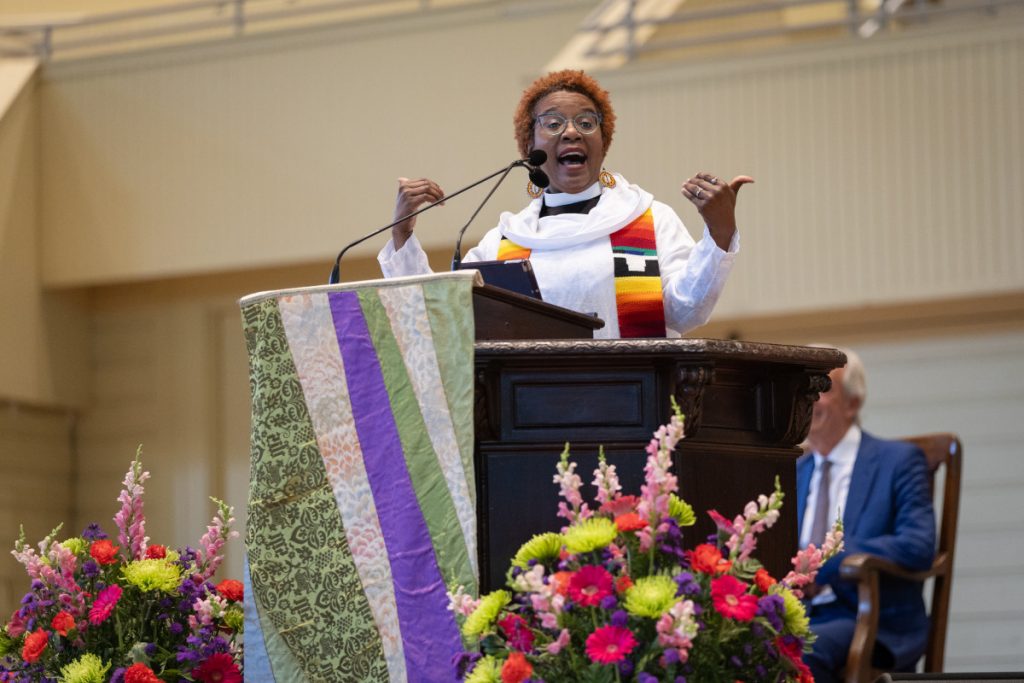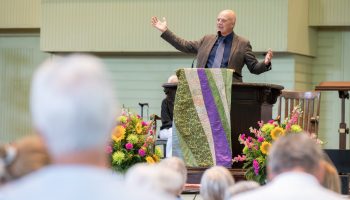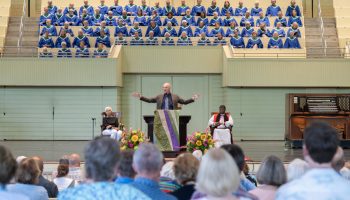
“You realize that Jesus could have performed his first miracle anywhere, using anything,” the Rev. Canon Stephanie Spellers told the congregation. “He could have sat the 5,000 people down and fed them bread and fish, he could have raised his best friend from death, he could have sent a bunch of demons into pigs.”
She continued, “He got around to those things. By choosing a wedding at Cana, he turned water into good wine, which shows he appreciated a good vintage. There were 180 gallons of wine; it flowed just as the party was winding down. Jesus knew how to keep a party going. The miracle came at a time in the party where the guests were too drunk to appreciate the wine. A sensible person would have less wine, and it would be from the bottom shelf. But there is nothing sensible about Jesus, and we might take a page out of his life.”
Spellers preached at the 9:15 a.m. Monday morning worship service in the Amphitheater. Her sermon title was “Save the Best for Last,” and the scripture reading was John 2:1–10.
To get the congregation ready to pray and hear, she got them on their feet and taught them a song. “Taste and see, taste and see the goodness of the Lord. / O taste and see, taste and see the goodness of the Lord, of the Lord.”
The Interfaith Lecture theme of the week at Chautauqua is an exploration of the Protestant work ethic. “You know, those Protestants who put the tight in uptight, the pure in Puritan. They had no fun, no joy, no color (in their clothes or houses) and they ignored the body,” Spellers said.
These Protestants believed in working hard, saving as much as possible and maximizing profit. “This is great if your goal is to be the richest nation on earth,” she said. “If you want to try and live fully — this ain’t it.”
One of Spellers’ favorite movies is “Babette’s Feast.” She described the journey of Babette, a French woman whose husband and son died in a revolution, who comes to live in a Danish Lutheran sect that is dying off. Babette cooks for two sisters, and through her simple meals, she infiltrates their sad, grumpy lives.
When Babette wins the French lottery, she uses her winnings to prepare an incredible feast. The members of the sect swear they will resist the meal, calling it a Satanic temptation and they will try not to react or enjoy the meal. But they are overcome by the sumptuous, joyous feast.
“There is laughter, kindness, flushed faces and licked fingers. At the end of the meal, they gather and sing a song of thanksgiving,” Spellers said. “Babette continues as a servant (all her money is gone), but she is free and so are they. I loved it so much I named my cat Babette.”
The movie is an invitation to release ourselves from our intellectual reason for everything and listen to the wisdom of the body, Spellers told the congregation. “The wisdom of the body tells us to give away more so more people flourish and so everyone is free. Jesus starts on this path, and he stays on it to the end. He ate with tax collectors and healed lepers, wayward children were welcomed home with feasts, the wealthy were admonished to give away their goods for the sake of the poor, and in the end, he gave up his life so that his life blood would flow everywhere.”
She continued: “These are the ways of a wildly extravagant God. This is the way to thwart zero-sum economics. The detachment from the body is killing us.”
Spellers noted that, on average, people who earn less than $50,000 a year give about 3% of their income to charity. On average, people who earn over $100,000 give about 1 to 2% to charity.
“Why is it that people with more money and education hold on to more for themselves?” she asked the congregation. “Generosity to others does not appear to be a priority, and they appear to have bought into a lifestyle that consumer culture says is their right. Those with more give less to honor the most vulnerable.”
Psalm 9:1–10, which was used as the canticle in the service, describes God as one who governs with equity so that everyone can flourish.
“I will give thanks to the Lord with my whole heart; / I will tell you all your wonderful deeds. / I will be glad and exult in you; / I will sing praise to your name, O Most High. / When my enemies turned back, / they stumbled and perished before you. / For you have maintained my just cause; / you have sat on the throne giving righteous judgment. / You have rebuked the nations; you have destroyed the wicked; / you have blotted out their name forever and ever. / The enemies have vanished in everlasting ruins; / their cities you have rooted out; / the very memory of them has perished. / But the Lord sits enthroned forever; / he has established his throne for judgment. / He judges the world with righteousness; / he judges the peoples with equity. / The Lord is a stronghold for the oppressed, / a stronghold in times of trouble. / And those who know your name put their trust in you, / for you, O Lord, have not forsaken those who seek you.”
Spellers told that congregation, “We have internalized frugality, and our hearts are hardened. Who matters, we have determined, is much too narrow, and we draw our circles small.”
Jesus, she said, lived in a world like this, and he made a promise to an expansive, life-giving way of being — of not having, but giving away.
“Our cup is poured out by the God of justice and equity, and we need to pattern our lives on this God,” she told the congregation. “It is not safe, but it is about freedom, of moving from a black-and-white ethic to the technicolor feast of God. Cheers! Alleluia! Amen!” And the congregation responded, “Cheers! Alleluia! Amen!”
The Rt. Rev. Eugene T. Sutton, senior pastor for Chautauqua, presided. The Rev. John Morgan, pastor of the Williamsburg Presbyterian Church in Williamsburg, Virginia, read the scripture. Joshua Stafford, director of sacred music and the Jared Jacobsen Chair for the Organist, performed “Psalm 33,” by Emma Lou Diemer, for the prelude on the Massey Memorial Organ. The Motet Choir, under Stafford’s direction, sang a cappella “The Eyes of All,” music by Jean Berger and text from Psalm 145:15–16. For the postlude, Stafford performed “Psalm 29,” by Emma Lou Diemer. Support for this week’s chaplaincy and preaching is provided by the John William Tyrrell Endowment for Religion.




